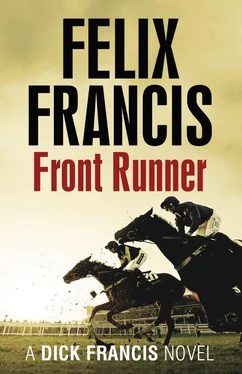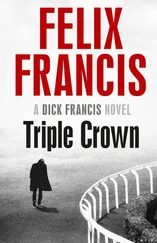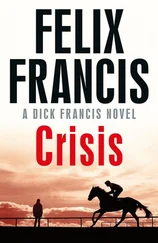‘Blues and twos,’ the paramedic shouted at his colleague who was driving. ‘Blood pressure’s dropping and his O saturation has fallen below ninety.’
I heard the ambulance’s siren start up. It couldn’t go quick enough as far as I was concerned.
The medic put an oxygen mask over my nose and mouth, which made me feel marginally better, but I was so tired — I could hardly keep my eyes open.
‘Stay with us,’ the paramedic said loudly into my ear. ‘Stay with us.’
He briefly disconnected the drip from the needle in the back of my hand and replaced it with a full syringe. ‘Adrenalin,’ he said, pushing the plunger, but I was barely listening. I was drifting off.
‘Don’t go to sleep,’ said the paramedic leaning over me and putting his face close to mine. ‘Come on, Mr Hinkley, you must stay awake.’
I forced my eyes open and was not greatly heartened by the worry lines on his forehead as he listened to my chest with a stethoscope.
‘I need you to sit up some more,’ he said, placing his arm around my shoulders and pulling me forward. The move helped a little but my breathing was becoming more and more laboured as I gasped for air, and still I felt so extraordinarily fatigued.
I was going to sleep and there was nothing I could do to prevent it.
In my last conscious moment before oblivion, I thought with despair: this is it — I’m dying .
I woke up lying on a hospital bed with all my senses switching back on at once.
I stared at the light fitting on the ceiling, could hear a beep-beep somewhere over my head of what I took to be a heart monitor, and I could smell the typical sweet aroma of hospital disinfectant.
My sensory nerves were fully operational as well, with my chest feeling like someone was driving nails into it. My abdomen was on fire and my throat felt like it had been rebored with a wire brush.
And I was thirsty.
I tried to speak, but my tongue seemed to be stuck to the roof of my mouth. All that I could manage was a groan.
‘Ah, you’re awake,’ said a voice.
I swivelled my eyes away from the ceiling and looked at a pretty young woman standing at the foot of the bed dressed in a blue nurse’s tunic.
‘Water,’ I tried to say through the oxygen mask that covered my nose and mouth. I’m not sure it came out quite right but she seemed to understand because she nodded and disappeared, returning with a cup and a straw. Nothing ever tasted better.
For a few moments when I’d first awakened, I had wondered where I was, then I remembered everything up to and including the hopeless feeling of impending death that I’d experienced in the ambulance.
I wasn’t dead — I was alive and in hospital.
Unless, of course, this was the afterlife.
I reckoned that it wasn’t, not unless this pain constituted Hell itself. I did consider that seriously for a few seconds but came to the conclusion that Lucifer was unlikely to have pretty nurses on hand to fetch water for the inmates.
I was still alive, and I was glad of it.
‘Do you know your name?’ asked the nurse, holding the oxygen mask away from my face.
‘Jeff Hinkley,’ I said, my voice still coming out as a croak.
‘How are you feeling?’
‘I hurt.’
‘I’ll fetch you something for that.’
She replaced the mask and disappeared from view, returning in a few moments with a small plastic cup containing some clear liquid.
‘Morphine,’ she said. ‘This will help.’
She held the mask away from my face again and helped me raise my head slightly to drink it down. Only then did I realize that I had a multitude of wires and tubes coming out of the side of my neck below my right ear.
A man came into sight. He was wearing surgeon’s scrubs.
‘So, Mr Hinkley, you’re still with us?’ I wasn’t sure if it was a question or a statement. ‘I’m Doctor Shwan. It’s Egyptian, like a swan only with an h. I’m the doctor that operated on you. You’re a very lucky boy. Very lucky indeed. I thought we’d lost you but we managed to bring you back.’ He smiled.
He’d called me a boy yet he was hardly older than I.
‘I feel like I’ve been hit by a truck,’ I said. ‘I’m so sore.’
‘I’m not surprised. I had to open both your chest and your abdomen.’
‘And my throat?’ I asked. ‘That hurts as well.’
‘We had to insert a tube down your throat in order to ventilate your lungs with oxygen during surgery. Normal breathing isn’t possible with the chest wall open. The tube tends to cause some minor discomfort for a while afterwards.’
It didn’t feel minor to me.
‘You rest,’ said the doctor. ‘I’ll tell you everything later.’
‘Tell me now,’ I said. I was never one for waiting.
‘You have thirteen separate stab wounds, most of which are superficial. Two of them, however, are deep. One penetrated the abdominal muscle wall and punctured your bowel, while the other, the most serious, passed between your second and third ribs on the left side, causing a laceration of the aortic arch just above your heart.’
I suppose I had asked.
‘It is that one that almost killed you,’ he said. ‘It caused substantial bleeding into the chest cavity, which compromised your breathing and also filled the space around the heart with blood, giving it no room to beat.’
‘But I was fine for a while. I was even able to run.’
‘Yes, but all the time the chest cavity was slowly filling. Only when the blood got to a critical level did you suffer any symptoms. Usually, by then, it’s too late to save the patient. You had a cardiac arrest as you arrived at A & E and I had to perform an emergency thoracotomy right there and then to get your heart pumping again. There wasn’t even time to get you to the operating theatre. As I said, you’re a very lucky boy.’
‘Very lucky to have you around when I needed it.’
‘I don’t know about that,’ he said with a smile. ‘Yours was the first chest I’ve ever opened. I’ve only ever seen it done by others. I’m an Accident and Emergency doctor, not a heart surgeon. But needs must, and it seems to have worked.’ He made a movement as if to mop sweat from his brow.
I knew from my time with the army in Afghanistan how extreme situations could require desperate solutions well out of one’s comfort zone. And how it takes immense courage not to wait for someone with the right experience but to make the decision to do it yourself, because to wait would be to fail.
‘Thank you, Doctor Shwan,’ I said, meaning it.
‘Don’t thank me yet,’ he said. ‘Give it another forty-eight hours or so. A trolley in A & E is not the most sterile of environments to perform heart massage or to repair a major artery. I’m just hoping you won’t get an infection. We are delivering antibiotics direct to your heart cavity, yet we can never be sure. And then there’s the rupture of your bowel. I repaired that as well but there’s always a chance of peritonitis.’
‘Well, thank you anyway,’ I said, ‘for what you’ve done so far.’
‘You need to rest now. Give your body the chance to heal itself.’
The morphine was finally beginning to work. I closed my eyes.
‘The police are outside and they’re keen to speak to you,’ he said. ‘I’ll tell them they have to wait.’
Good idea, I thought. Let them wait.
There would be plenty of time later to think about why I’d been attacked and who would have done such a thing to me.
Twice in eight days, someone had tried to kill me.
I just hoped it wouldn’t be third time lucky.
The police in the form of two plain-clothes detectives were finally allowed in to question me the following evening, by which time the pain in my chest had subsided a little from an unbearable level 10 to an almost manageable 8.
Читать дальше












